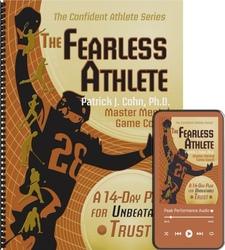
How can you create positive competitive habits?
The answer is by working on those habits during practice. How do you battle during competition and not back down?
Again, the answer is to compete in practice from start to finish.
There is a saying, “Elite athletes practice in the same manner they want to compete.” Too often, athletes think they can “flip the switch” and take their performance to a new level in competition.
However, many athletes only try hard and focus when performing a drill they like. They only give their full attention when it’s a skill they want to work on.
These athletes may ignore minor aspects because they feel their impact is relatively insignificant. They pick and choose when to go full speed or give their complete focus to a task.
In truth, practice habits become game-time habits. When you think talent is more important than practice, you will go through the motions during some practices or put in the work when it’s convenient.
Unfortunately, under stress late in a game or when an athlete tires, habits take over.
If you are lax in practice or let up before practice finishes, you will be lax in competitions or let up before the final whistle.
If you are not aggressive in practice and don’t compete against your teammates during training sessions, those habits will appear in competitions.
If you back down in practice when playing against the best player on your team, you will probably back down against elite players during competitive games.
Practice prepares you physically and mentally to play. If you don’t take full advantage of practice sessions, you develop non-productive habits, will underperform in competitions, and fail to reach your full athletic potential
Philadelphia Eagles wide receiver A.J. Brown has focused on preparing rookie cornerback Quinyon Mitchell for his first NFL regular season. To sharpen Mitchell’s competitive mindset and develop positive habits, Brown challenges him every day in practice.
BROWN: “I know these are camp battles, but ultimately, I’m just trying to get him prepared for when we play in September, and that can carry on. He doesn’t back down. He hasn’t backed down not one time, and that’s what I want to see.”
When you constantly challenge yourself in training sessions and develop positive habits, competition challenges won’t be daunting.
In addition, you will feel more confident and up to the challenge in competitions because you passed the test in practice.
To determine your competitive habits, ask yourself the following questions:
- When I am tired in practice, do I continue to work hard until the end of the session?
- Do I say focused throughout practice? When I lose focus, do I recognize my lapse in concentration and reset my focus?
- How do I react to mistakes in practice? Will that reaction help my performance in competitions?
- Do I practice with a competitive mindset or go through the motions in training sessions?
- Am I aggressive throughout practice, or do I let up at times?
- Do I bring a high level of intensity to practice?
These questions will give you insight into your mental habits. Once you gain insight, you can set some target areas to improve for future training sessions.
Related Sports Psychology Article
- How to Deal with External Noise
- Leaving a Positive Legacy for Athletes
- How Top Athletes Improve Focus
The Fearless Athlete (Digital Download)

“The Fearless Athlete” audio and workbook program helps you overcome fear and anxiety to perform with trust and confidence. Learn how to overcome the mental handcuffs of perfectionism and fear of failure, leading you to perform with unshakeable trust in your skills.
With the use of the ‘The Fearless Athlete’ and ‘Ultimate Sports Parent’ workbooks, I see subtle but significant results in a short period of time. My young athlete did not even know about positive self-talk until we started the program.”
~Adam, Sports Parent
